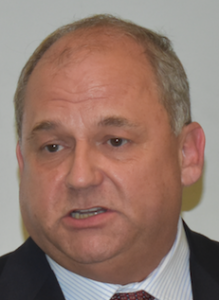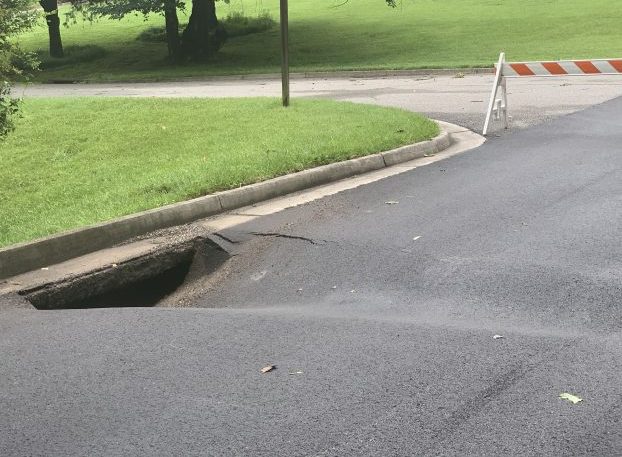Solar facility discussed
Published 3:55 pm Thursday, September 6, 2018
The Cumberland County Planning Commission approved to recommend a zoning ordinance to the board of supervisors that provides guidelines in the event the county considers installing solar facilities in the county.
The commission voted to approve the ordinance with amendments that include changes to potential distribution lines and regulations to solar facility decommission, or when the facility is taken down.
Five commission members voted in favor and one voted in opposition to the ordinance.
Trending
The Cumberland County Board of Supervisors is expected to hold a public hearing about the ordinance Tuesday.
The planning commission meeting, which took place Aug. 27, heard from a company interested in being involved in installing a community solar facility in the county.
Rex Young, an in-house attorney for Cooperative Solar, LLC, based in Durham, North Carolina, said in a phone interview the company is in the process of applying for a conditional use permit to build a two-megawatt solar facility in Cumberland.
Young said the facility would act as a community solar facility program, meaning that residents or an industrial company could potentially sign up to be powered through the solar facility.
Young said whether the facility is for residential or industrial use is determined by the utility company that would distribute the solar electricity to the area.
Young said the facility could give people another choice in how they receive their electricity.
Trending
“You flip the lightswitch on and you really don’t know where that’s coming from,” Young said. “This is one way that we’re trying to help, the utility is trying to help change that and make it a little more available.”
Young said a two-megawatt facility could span between 15-20 acres and power up to 300 homes a year.
He said the residents or industries that could use the facility, including the proposed Green Ridge landfill, has not been determined as participants would have to sign up.
Young said the company approached Cumberland about potentially installing the facility, but said the county did not have an ordinance for solar facilities.
Young said that Cooperative Solar’s role is partnering with solar facility companies to install solar facility projects.
He said Cooperative Solar is working with Southern Current, a solar company based in Charleston, South Carolina, to apply for a solar facility in Cumberland.
Young plans to be at the board of supervisors meeting Sept. 11. He said the application could move forward if the ordinance is approved, and the planning commission and board of supervisors could hold hearings on the solar facility as early as October.
‘Uncharted territory’
Cumberland County Planning and Zoning Administrator J.P. Duncan confirmed that the county received multiple inquiries about solar facilities in addition to the inquiry from Cooperative Solar.
During the meeting, Duncan noted there was interest in placing a solar facility in the Catersville area. Duncan said in an email the firm that approached the county about the Cartersville land did not provide an address or tax map number of the parcel. He could not recall the name of the firm that approached the county about the Cartersville parcel.
Duncan said the ordinance for solar facilities is proposed to be added to other uses in the county that can be built with a conditional use permit in the Agricultural-2 district.
Duncan suggested an amendment for this that would allow solar facilities to also be built in Residential-2 districts.
District Four Supervisor Hubert Allen asked about the parcel of land that had been the former site of Republic landfill zoned Industrial-2 (M-2). Commission members discussed and included a suggestion to add Industrial Zoning in addition to Agricultural and Residential zoning for solar facilities.
Duncan said some of the conditions and research he used for the draft ordinance came from nearby Buckingham County’s ordinance for solar facilities.
Buckingham is in the process of installing a solar farm, Buckingham I Solar Facility from Dominion Energy. That solar farm is expected to have approximately 66,000 solar panels and produce 20-megawatts that will be acquired by Amazon’s cloud computing business, Amazon Web Services (AWS).
The Cumberland draft solar facility ordinance includes 22 conditions. Conditions include that solar facilities that are dedicated solely producing electricity for another facility located on the site would not be subject to the conditional use permit requirements; that a site plan is required; that all solar equipment must have a UL Listing or an equivalent to determine it meets all standards; that any distribution lines be installed underground; that an erosion and sediment control plan be installed and reviewed by a third-party source, signed off by the Peter Francisco Soil & Water Conservation District and enforced by the county before any land disturbance, and then that the facility contain a vegetative buffer.
In the event the facility is decommissioned, or taken down, the draft ordinance requires that the system owner and the owner of the land the facility is responsible or liable to jointly and separately, to “remove all obsolete or unused systems, facilities and equipment” within six months.
William Shewmake and Young spoke during the public hearing.
Shewmake with LeClair Ryan law firm acted as the attorney for Cooperative Solar.Shewmake is currently the attorney for Green Ridge, LLC, the company in the process of obtaining a permit from the Virginia Department of Environmental Quality (VDEQ) to install a landfill in the county.
Shewmake asked the commission to consider adding a detailed decommission plan for the facility, including how the material would be removed.
“I know that Cooperative Solar would love to see this go through,” Shewmake said about the draft ordinance. “I think that there’s been a lot of good work done on this.”
Allen expressed concern about the six-month time period, saying he did not feel it was reasonable.
“This is uncharted territory,” Allen said about the process.
Shewmake suggested that the industry initiate decommissioning within six months and complete decommission within 12 months of cessation of operation. Members of the commission accepted the suggestion.
The facility would also need to prevent any visible glare at the property line, meet any Federal Aviation Administration guidelines if the facility is within five nautical miles of an airport, take any inventory of and avoid wetlands, and provide a written notification to the county in the event of any changes of ownership or operator.
Duncan said the guidelines would be for industrial solar facilities and would not apply to residential solar panels, for example someone wanting to install a solar panel on the roof of their home. He said residential solar panels would be considered by-right use.
Shewmake provided recommendations to the commission that included establishing a conditional use permit for solar facilities. For condition four on the draft ordinance that discusses installing distribution lines underground, Shewmake suggested adding “to the extent permitted by the utility company,” citing that solar facilities may not get a say if a utility company such as Dominion Energy asks that a line be installed above ground.
Duncan and the commission accepted the suggestion. Young said no new lines are expected to be added for the potential solar facility.
Shewmake also suggested that the commission increase the decibel level from its current condition of 40 to 50
He said 40 decibels is equivocal to what one would hear in a library whereas 50 is a conversation at home.
Concerning the condition for abandonment, Shewmake spoke about an aspect of the condition where any unpaid charges for the property would constitute as a lien, or a claim to repay the property the solar facility would be based, and would be held to the same level of enforcement as unpaid county taxes.
Shewmake said while that may not be an issue for solar companies, he said it could be an issue for property owners and asked the county to consider striking it.
Members of the commission decided to keep the lien as a protective measure in the event of an emergency or if the company does not meet its obligations.
Young questioned the necessity of having a third-party review of the erosion and sediment control plan and suggested solely having the Peter Francisco Soil & Water Conservation District review it.
Duncan said Kelly Snoddy with Peter Francisco is Cumberland’s reviewer for erosion and sediment control issues. Commission Chairman Bill Burger said the applicant would pay for the third-party source. Young said the reviewer would come from the county’s selection.
Young echoed Shewmake’s suggestion of increasing the decibel level to 50.
When asked of any potential connection between Cooperative Solar and Green Ridge, particularly through having Shewmake as attorney for both, Young said he and Shewmake met at a solar zoning meeting in another county and Young contacted him.








